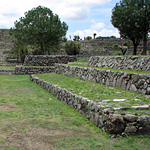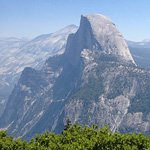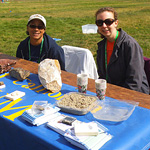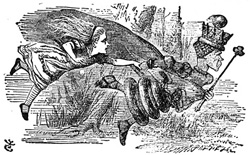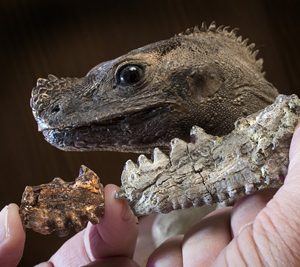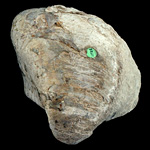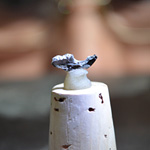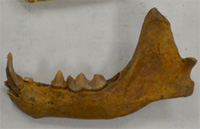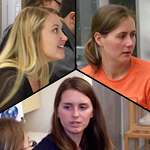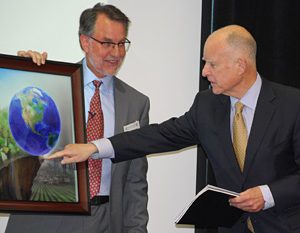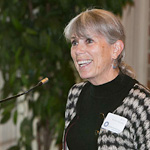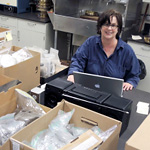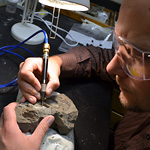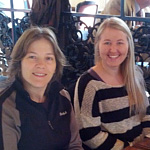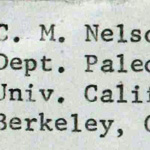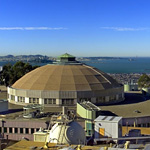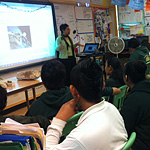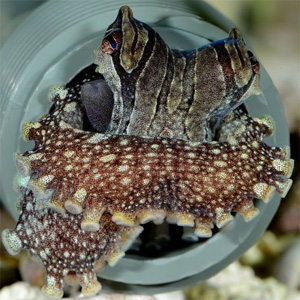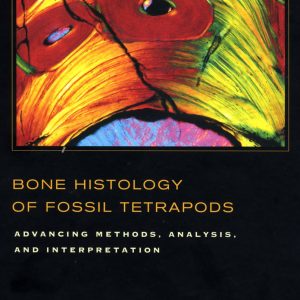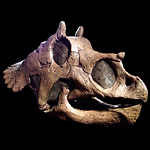My research focuses on the Holocene geological time period, the last 10,000 years of Earth history. An accurate picture of past climate can help us understand the relationship between past environmental change and ancient societies. In this post, I describe how my summer fieldwork and my broader dissertation project link summer rainfall, microscopic grains of pollen, and an ancient city in Mexico. The pre-Columbian city of Cantona is an impressive sight, even today. Located near the border of … [Read more...] about Pollen may help solve the mystery of why a pre-Columbian city in Mexico was abandoned
Latest News
Engaging the next generation of geoscientists
Most Earth scientists have vivid memories of their first geological field trip, but how many can say their first experience was as a high school student on a trip led by 15 professors, professional scientists, and college students? Thirty lucky students from the Bay Area, El Paso, and New Orleans were selected to participate in a ten-day, geology-of-California field trip that started along the San Andreas Fault at Pt. Reyes National Seashore and ended at Yosemite National Park. Led by UCMP … [Read more...] about Engaging the next generation of geoscientists
Fossil bridging with the Girl Scouts
What Bay Area event brings together 5,000 eager girls, 50 exhibitors and a walk across the Golden Gate Bridge? Girl Scout Bridging! On Saturday, May 11, Lisa White, UCMP Director of Education and Public Programs, and Erica Clites, Museum Scientist, attended the annual Girl Scout event at Crissy Field in the Presidio of San Francisco. The Bridging is a symbolic event recognizing the transition from the Junior level of Girl Scouting to Cadette, and the girls — representing troops throughout … [Read more...] about Fossil bridging with the Girl Scouts
Marshall shows terrestrial mammal extinction due to Red Queen with new work published in Science
By studying 19 groups of Cenozoic mammals Charles Marshall and Tiago Quental tested and confirmed the Red Queen hypothesis. Red Queen is the hypothesis that states that groups must continue to adapt and evolve in response to their environments in order to survive. It's not just extinction events that threaten groups--it's also low rates of origination of new species. The new research (published in Science) shows that these mammal groups have experienced diversity declines in part due to their … [Read more...] about Marshall shows terrestrial mammal extinction due to Red Queen with new work published in Science
Warmer climates can lead to big lizards
Pat Holroyd and co-authors describe a new species of giant lizard in the latest issue of Proceedings of the Royal Society B. The fossil jaw bones of this lizard have been in the UCMP collection since the 1970s, but it took a while for them to be recognized as something special. The specimens are from an herbivorous lizard that lived in the warm climate of Asia 40 million years ago. Dubbed Barbaturex morrisoni, this lizard was much bigger than the largest herbivorous lizards alive today. The … [Read more...] about Warmer climates can lead to big lizards
Reports from Regatta: T.W. Stanton, prominent contributor to the USGS Invertebrate Collection
In the orphaned U.S. Geological Survey’s (USGS) Menlo Park Invertebrate Collection, now housed in the UC Museum of Paleontology’s off-campus collections space in the Regatta Building, the work of prominent USGS collectors stands out. One of these dedicated and proficient invertebrate paleontologists was Timothy William Stanton, who amassed collections from over 100 localities, authored monographic research papers, and wrote more than 600 technical reports evaluating the age of collected … [Read more...] about Reports from Regatta: T.W. Stanton, prominent contributor to the USGS Invertebrate Collection
Small discoveries from the Caldecott Tunnel Project
Some of the most interesting fossils a paleontologist can find in the field are not necessarily the biggest. During construction of the fourth bore of the Caldecott Tunnel, scientists working with the California Department of Transportation (CalTrans) collected micro-vertebrate fossils, including teeth, jaws and even toes of small animals such as rodents and amphibians. Sediment thought to contain potential fossils was washed through mesh screens, and the remaining material was carefully … [Read more...] about Small discoveries from the Caldecott Tunnel Project
Werning blogs at PLOS about the fossils of the Sierra Nevada
In her latest post over at the Public Library of Science blog The Integrative Paleontologists Sarah Werning writes about about what the fossil history of California can teach us about climate change. UCMP is teaming up with other Berkeley natural history museums on the Berkeley Initiative in Global Change Biology to strive for a comprehensive picture of the effects of climate change on past, present, and future life. Read Sarah's post here. … [Read more...] about Werning blogs at PLOS about the fossils of the Sierra Nevada
UCMP students honored with 2013 Paleontological Society Student Grants Awards
Dori Contreras (Looy Lab), Renske Kirchholtes (Looy Lab), and Allison Stegner (Barnosky Lab) will each receive awards from The Paleontological Society to support their research. Each year the Society grants Mid-America Paleontology Society (MAPS) Outstanding Research Awards to the top three student proposals received and honors a student with the G. Arthur Cooper Award for student research. Dori Contreras will receive a MAPS Outstanding Student Research Award to support her research titled: … [Read more...] about UCMP students honored with 2013 Paleontological Society Student Grants Awards
Barnosky presents statement on global environmental problems to Governor Brown
When California governor Jerry Brown challenged scientists to put global change issues into terms that political leaders can understand UCMP's Tony Barnosky stepped up. On May 23 Barnosky and colleagues presented a 30-page statement entitled Maintaining Humanity’s Life Support Systems in the 21st Century to the governor. It's a strong statement about global environmental problems and what people must do to insure the future health of the planet with signatories from 44 countries including two … [Read more...] about Barnosky presents statement on global environmental problems to Governor Brown
Another feather in Judy Scotchmoor’s cap
Our very own Judy Scotchmoor, Co-Director of Education and Outreach at the UCMP, received the 2013 Chancellor's Award for Public Service. The award honors outstanding public service by UC Berkeley undergraduates, graduate students, faculty, and staff. The Civic Engagement Award received by Judy is, in part, for her exceptional ability to develop, nurture, and leverage collaborative partnerships and resources to better engage the public with exciting and accessible science. In a public ceremony … [Read more...] about Another feather in Judy Scotchmoor’s cap
Finding forams in the Caldecott Tunnel
Day after day, over the course of two years, the massive tunnel borer worked its way through the sedimentary rock layers of the Berkeley Hills during the construction of the fourth bore of the Caldecott Tunnel, grinding up the rocks in the process into fist-size pieces that were later deposited outside the entrance of the tunnel. At the end of each work day, paleontologists sifted through these piles, referred to as the day’s "spoils." They were not only on the lookout for fossils of plants and … [Read more...] about Finding forams in the Caldecott Tunnel
Prepping the fossils from the Caldecott Tunnel
For the last semester I have been lucky enough to work as the GSR (graduate student researcher) for the spring semester at the UC Museum of Paleontology fossil preparation lab (prep lab) under the supervision of our new lab manager, Jason Carr. It has been fun getting back into the preparation role, something that I did as a job after college. The material we have to work on varies a lot which keeps the work interesting. It requires a variety of techniques, so I get to do something different … [Read more...] about Prepping the fossils from the Caldecott Tunnel
The Looy Lab paleo detectives: Dori and Cindy at the NMNH
Tuesday morning, February 12, 2013, Dori Contreras and Cindy Looy woke before dawn to catch a cross-country flight to Washington, DC, for a two-week visit to the Smithsonian’s National Museum of Natural History (NMNH). Originally, Cindy was going to attend a biannual workshop of the Evolution of Terrestrial Ecosystem Program. However, after Dori obtained a Sigma Xi grant to study a fossil leaf collection housed in the NMNH’s paleobotanical collections, they teamed up and turned it into a joint … [Read more...] about The Looy Lab paleo detectives: Dori and Cindy at the NMNH
Reports from Regatta: Two Cal Alumni and the USGS Menlo Park Collection
As undergraduate work-study students recataloging the United States Geological Survery (USGS) Menlo Park Invertebrate collection at the UCMP, we've come across the names Nelson and Addicott time and time again in extensive database entries or on the original, yellowing locality cards paired with each specimen. The names of the paleontologists and geologists responsible for collecting these fossils in the Menlo Park collection are largely unknown to us, but found immersed within the aging drawers … [Read more...] about Reports from Regatta: Two Cal Alumni and the USGS Menlo Park Collection
The Looy Lab paleo detectives
Solving the mysteries of the past and present one rock at a time East of the Berkeley campus, we see the beautiful, green Berkeley Hills, the golden letter "C" and a somewhat classy-looking, dome-shaped building on the Lawrence Berkeley National Laboratory campus. This houses the ALS, or Advanced Light Source. Personally, I find the name a bit silly because it doesn't seem to capture the awesomeness of this giant machine. It's like calling the Space Shuttle a Progressive Flying Tool. The ALS … [Read more...] about The Looy Lab paleo detectives
Darwin Day Roadshow
It is not unusual to see evolutionary biologists around the world involved in celebration activities on February 12th — the reason? Charles Darwin's birthday! UCMP and the National Evolutionary Synthesis Center (NESCent) are no exception and this year the activities overlapped. Two years ago, NESCent initiated the Darwin Day Roadshow in order to bring evolutionary science to schools and museums around the country. This year, Lisa White was asked by NESCent to bring the Roadshow to Urban … [Read more...] about Darwin Day Roadshow
Caldwell’s rare octopus research makes headlines
Roy Caldwell has been working with Richard Ross of the California Academy of Sciences to study a rare, beautiful, and so far unnamed species of octopus. Their work, along with some of Roy's photos, is the subject of a feature article in the San Francisco Chronicle. … [Read more...] about Caldwell’s rare octopus research makes headlines
New bone histology book from UCMP and UC Press
The University of California Press has just published Bone Histology of Fossil Tetrapods: Advancing methods, analysis, and interpretation. The book represents the proceedings of an NSF-sponsored workshop and is the first comprehensive summary of the field of fossil bone histology. The twelve authors of the various chapters cover topics ranging from basic bone biology to calculating and analyzing the evolution of growth rates in bones, in addition to step-by-step instructions for setting up a … [Read more...] about New bone histology book from UCMP and UC Press
Cataloging the Archives: Three Fine Trikes
Another in a series of blog posts relating to the museum's "cataloging the archives" project Ask children what their favorite dinosaurs are, and it's almost guaranteed that Triceratops (refer to them by their nickname, Trikes, and you'll earn tons of street cred) will be on the list. The three-horned, frilled wonder is one of the most recognizable creatures of the Cretaceous. Many a visitor has walked by the Triceratops display here in the Valley Life Sciences Building's Marian Koshland … [Read more...] about Cataloging the Archives: Three Fine Trikes
